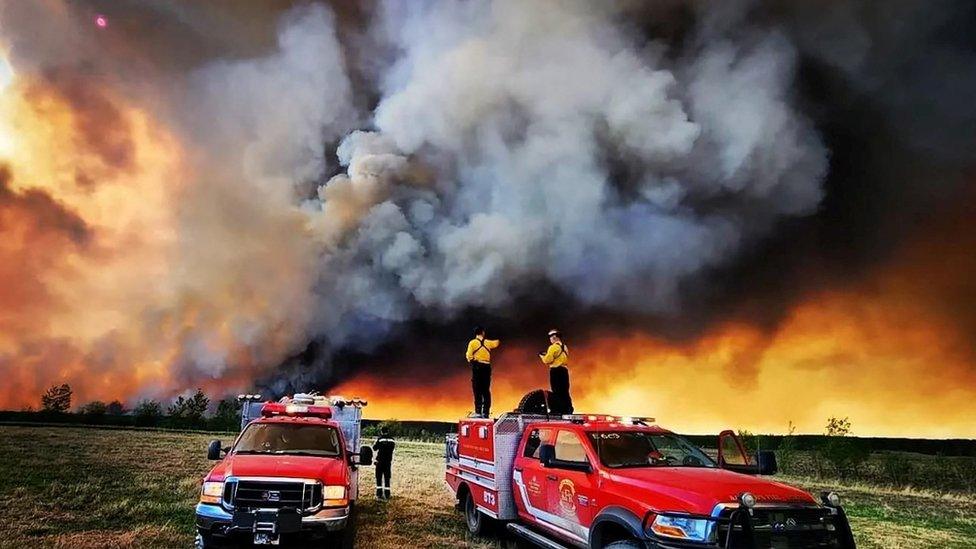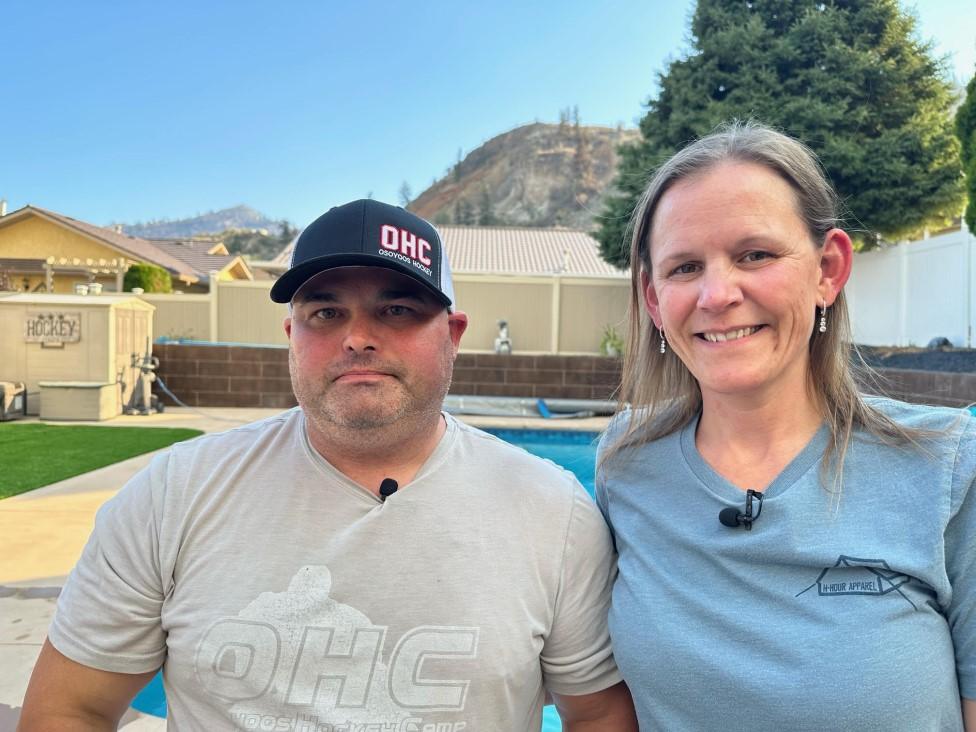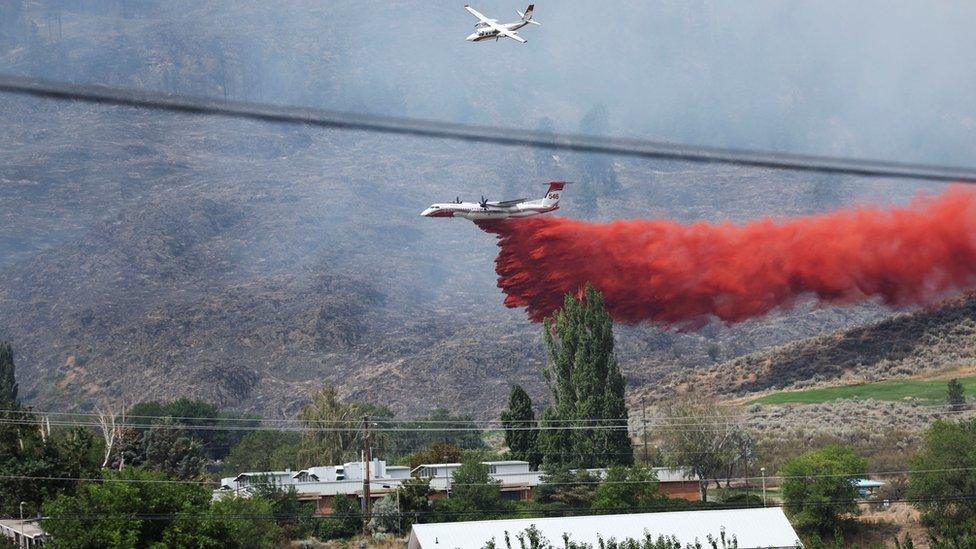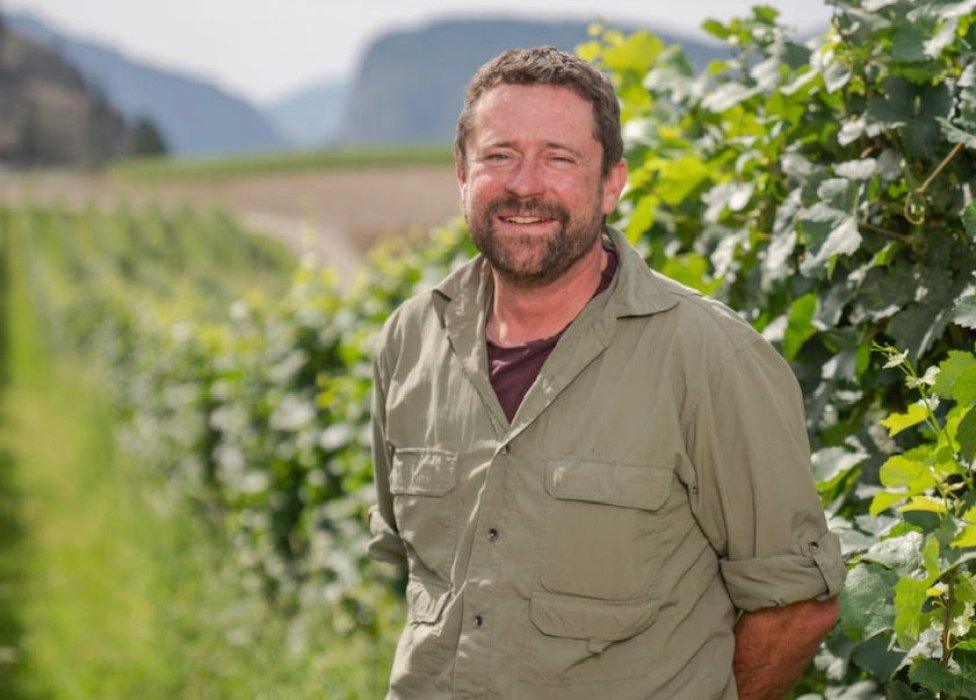Osoyoos wildfires: 'We grabbed what we could'
- Published

Wildfires have been burning in British Columbia since May
Fire crews are still battling to contain the Eagle Bluff Wildfire that nearly engulfed the town of Osoyoos in British Columbia. Hundreds of people, like the Maynard family, had to flee their homes.
Teenager Danica Maynard and her friend Callie were the first to notice how close the flames were getting to their home, while they were playing outside with the dog.
Mum and dad, Thasha and Dean, immediately rushed to pack up the family, their guests and their most valuable possessions.
"What I cannot replace is what I was grabbing. Humans, animals, and whatever I could quickly grab on the way out," Thasha told the BBC.
Thasha's son Adnon, 19, thought his mother was joking when she screamed for him to pack his belongings, until he stepped outside and saw the scene unfolding before him.
"A sense of panic, quite intense, set in after I realised it wasn't a joke," he said.

Dean and Thasha Maynard
As a retired Royal Canadian Mounted Police officer, Dean Maynard received honours for evacuating people out of a wildfire, but he's never faced one this close to home.
In the time it took them to flee to their friends' house, where they could watch the fire from a safe distance, they could see it had already reached their home.
"Sitting on their deck and watching it, it was already to our place within minutes," said Dean.
The Maynards stayed with friends until it was safe to return home on Monday.
The ash and chunks of debris from the fire were all over their yard and in their pool, showing how perilously close the flames had come to their property, which was unscathed.
Teams on both sides of the border have been carrying out controlled burns to create a fire break over 1,800 hectares of steep and rocky terrain which pose safety risks to crews.
The aerial and ground controlled burns on the US side are complete and were set to continue on the Canadian side on Thursday.
The goal was to intentionally remove trees and brush in order to suppress the north and west flanks of the fire.
Hot, dry weather conditions in the region over the past few days have caused the Eagle Bluff wildfire to grow in size and it is now more than 3,000 hectares large on the Canadian size of the border.
Other fires are also causing chaos in other parts of British Columbia.
The Downton Lake wildfire destroyed a number of properties about 300km north of Vancouver, and an evacuation order was issued for 92 properties on the shore of Adams Lake near Kamloops.
The fires are currently moving away from Osoyoos to the west, and as a result, evacuation orders in town are easing. Still, authorities have warned that the situation is still evolving, and residents could be asked to leave at short notice should conditions change.

An air tanker drops fire retardant on an Eagle Bluff wildfire after it crossed the Canada-US border
This small desert town of 5,500 people is a popular summer destination for Canadians because of its natural beauty and lakes.
Throughout Osoyoos, there are tributes to the firefighters; hotel signs thank them and restaurants such as Jojo's café offer them free coffee and food. There was also a desire to get the town back up and running.
On Osoyoos Lake, boats were out and water activities resumed even as firefighting planes and helicopters went back and forth to carry water to the fires. BC Wildlife Service urged those out to keep away from areas where aircraft were operating.
Besides tourism, the Okanagan Valley is also well known for its wineries. Matt Mavety runs the Blue Mountain Vineyard with his family which looks out onto Vaseux Lake and is surrounded by mountains.
Their business and property has historically been impacted by wildfires, with the worst one in 2021 when a fire was just over a kilometre away.

Matt Mavety
They lost 80% of their sales from the 2021 harvest because smoke damage to the grapes meant they couldn't bottle their vintage wines. They are still feeling those losses.
"The reality for us is we are farmers, at the end of the day and we are having to live with a lot of environmental risk," Mr Mavety told the BBC.
"There's not a lot of options depending on how intense or how contaminated the fruit is to how to process or how to deal with it."
The Eagle Bluff Wildfire is one out of more than a thousand burning across Canada right now.
Already this is the worst wildfire season on record, even as several weeks remain.